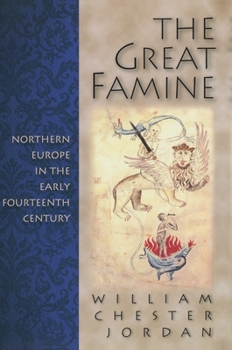The Great Famine: Northern Europe in the Early Fourteenth Century
Select Format
Select Condition 
Book Overview
The horrors of the Great Famine (1315-1322), one of the severest catastrophes ever to strike northern Europe, lived on for centuries in the minds of Europeans who recalled tales of widespread hunger, class warfare, epidemic disease, frighteningly high mortality, and unspeakable crimes. Until now, no one has offered a perspective of what daily life was actually like throughout the entire region devastated by this crisis, nor has anyone probed far...
Format:Paperback
Language:English
ISBN:0691058911
ISBN13:9780691058917
Release Date:December 1997
Publisher:Princeton University Press
Length:328 Pages
Weight:1.10 lbs.
Dimensions:0.8" x 6.1" x 9.2"
Related Subjects
16th Century Agricultural Sciences Europe History Humanities Ireland Modern (16th-21st Centuries)Customer Reviews
1 rating
The Great Famine
Published by Thriftbooks.com User , 17 years ago
Read this for graduate history course in medieval history. William Jordan Book is great as a source material book. Excellent scholar. One of the 1st Economic, environmental historicists. A Good multi disciplinary approach. His mortality numbers tend to be on the conservative side. A food shortage is when 1 staple is unavailable or food unavailable for 1 year. Those items people crave are more expensive but are attainable. Great Famine is a catastrophic failure of agriculture. All food groups fail items unavailable for any price. Because of famine, you get weir foods like acorn bread, awful taste. 1315-22, does not affect Spain, Italy, Greece, and Scotland. Bad in Germany N. France, Scandinavia England, Ireland. 400,000sq. miles, 30 million people. Famine follows big population explosion 1100-1300. 1250 agricultural productivity is declining. As population increases technology in food production can't keep up. 3 field crop rotation means 1/3 of field is fallow. Harness technology goes to animal shoulder to increase productivity, better plough blades thus soil gets better aeration. Green manure is bean plants rich in nitrogen get plowed into ground, brown manure is animal and human waste. Cattle graze on land leaving droppings. 14 century animals not producing enough manure as #'s dwindle, Increase in population means more marginal land is being farmed not working out well, also means more calories burned working marginal land than being produced. Also means livestock have less land to graze on. Page 12-13 Looks at David Arnolds 4 scenarios for the inset of famine. 1. Population numbers are higher than productive means. 2. Sustained failure of appropriate weather. 3. Problems of food distribution, from transportation and war. 4. Peasants not changing their growing methods to meet the problem. Jordan thinks the most troubling scenario is the last one. We have good skeletal remains to show that their was a lot of bone problems from people working hard in the fields. Biggest cost for medieval people is food, 70% of income; housing is only 10% of income. When food in Paris increases 800% you know you will have food riots. No good social systems to deal with the problem. They ate their seed corn, grains, and rye susceptible to molds, and fungi poisoning people. Can't store grain for long periods of time, rats eat allot of grain in storage. There is no fallback for people agriculturally. Seeds produce 4 or 5 to 1. You get 4 seeds for 1 planted. Less animals means less manure. Chicken eggs are used to pay rent, chickens are the size of today's game hen's chickens get eaten fast. Jordan says this won't happen today because we have global agriculture and world wide distribution system. Only happen in regions as political tool, like Darfur, or what Stalin did using food as a weapon. Long term suffering and starvation was more routine to these people's lives, did not affect them psychologically as the Black




